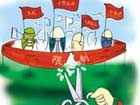| Videos | ? Latest |
|
? Feature | ? Sports | ? Your Videos |
Respite for Wenzhou small and medium enterprises

 0 Comment(s)
0 Comment(s) Print
Print E-mail
CNTV, Xinhua, October 19, 2011
E-mail
CNTV, Xinhua, October 19, 2011
China's eastern city of Wenzhou has submitted a proposal to the Zhejiang provincial government about regulating private financing and building the city into a distribution center of private capital, local officials told Xinhua on Monday.
Zhang Zhengyu, an official with the municipal government's financial office, said the local government will strive to build Wenzhou into a pilot zone for financial reform and innovation, the healthy development of private financing, and for providing quality financing services to small- and medium-sized enterprises (SME).
Zhang said Wenzhou will set up, on a trial basis, non-governmental financing institutions, including micro-finance companies, private capital management companies and registering centers for private financing.
Wang Gang, vice director of Wenzhou's Consultative Committee for Decision Making, said the government should set up more public service platforms like private capital service centers, which can provide legal and grantee services for both sides of financing.
"As long as the interest rate is no higher than four times the rate of official bank loans, private capital centers should provide comprehensive supporting services to lenders and borrowers," said Wang.
Wang said Wenzhou will also intensify supervision on private financing by integrating efforts at both the municipal level and the county level.
The city's robust private sector has allowed it to make a name as one of China's wealthiest cities. The city's 400,000 private firms contribute to more than 90 percent of the city's gross domestic product.
Wenzhou was recently hit by a severe debt crisis, in which at least 80 business people were reported to have disappeared, committed suicide or declared bankruptcy -- invalidating debts owed to individual creditors pooled from the informal lending market.
Zhou Dewen, chairman of the Wenzhou SME Development Association, said that about half of SMEs in Wenzhou have had difficulties in obtaining loans from banks and resorted to acquiring capital from the unofficial lending market, despite high interest rates.
The Wenzhou debt crisis is an extreme case of small- and mid-sized private companies struggling to survive the liquidity crunch, a result of the country's monetary tightening policy.
During a visit to Wenzhou on Oct. 5, Premier Wen Jiabao advised banks to lend more money to small firms and tolerate higher levels of debt. He also requested a crackdown on the high-interest informal lending market.
Yi Xianrong, a researcher with the Institute of Finance and Banking of the Chinese Academy of Social Sciences, said Monday that rampant high-interest informal lending had come about because of poor government supervision.
"In solving the informal lending problem, the government should not focus only on the financing difficulty that SMEs face. Without adequate supervision, there might be another round of high-interest lending," said Yi.
Yi said that although the government has moved to support SME's financing, governments at all levels should not try to bailout the companies or persons who conduct speculative activities, but rather severely punish those who are involved in illegal lending in accordance with laws.





